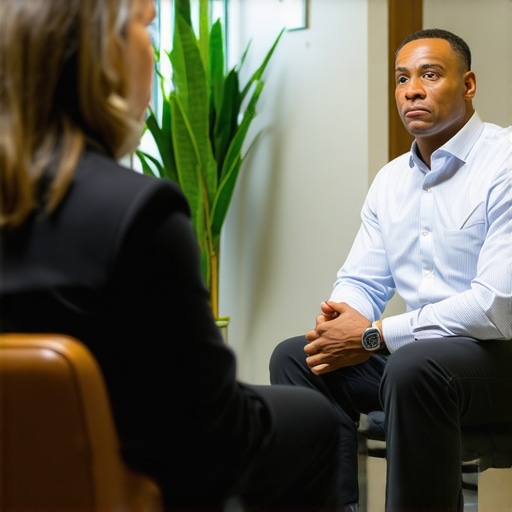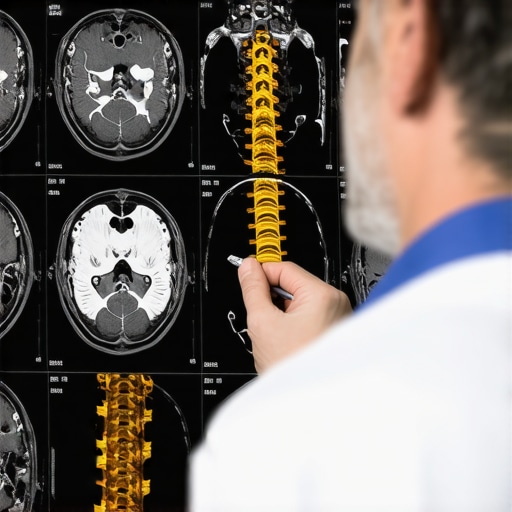My Journey with Orthopedic Care in NJ: When I Knew It Was Time for a Second Opinion
As someone who has faced my fair share of orthopedic issues, I understand how confusing and overwhelming it can be to decide whether to trust your initial diagnosis or seek a second opinion. My own experience began when I suffered a persistent knee injury that didn’t seem to improve with initial treatments. I was skeptical but decided to consult a different orthopedic surgeon in NJ for a fresh perspective, which ultimately led to a more accurate diagnosis and effective treatment plan.
The Value of a Second Opinion: Why It Matters
Getting a second opinion from experienced Second Opinion Orthopedic Surgeons in NJ can be a game-changer. It provides reassurance, confirms your diagnosis, or reveals alternative treatment options. I learned that not all orthopedic issues are straightforward, and sometimes, a different specialist can offer insights that significantly improve recovery outcomes. For example, when considering complex procedures like lumbar fusion, consulting a highly-rated surgeon can help determine if surgery is truly necessary or if non-surgical treatments might suffice, as discussed in this resource.
Signs You Should Consider a Second Opinion
In my opinion, there are clear signs that you should seek a second opinion, such as persistent pain despite treatment, conflicting diagnoses, or recommendations that seem overly aggressive. If you’re unsure about the necessity of surgery or alternative options, it’s wise to explore other expert opinions. For instance, if your doctor recommends spinal surgery but you’re hesitant, consulting top spine specialists in NJ can provide more clarity.
How do I know if my condition warrants a second opinion?
Trust your instincts—if something doesn’t feel right about your diagnosis or proposed treatment, or if you’re experiencing ongoing pain that affects your quality of life, seeking another expert’s advice is prudent. Remember, your health and peace of mind are worth it.
If you’re contemplating getting a second opinion, I recommend visiting this contact page to find highly qualified orthopedic surgeons near you. Sharing your experience or questions in the comments can also be helpful for others navigating similar decisions. After all, informed patients make better choices, and in NJ, there are many trusted specialists ready to help.
Understanding the Nuances of Second Opinions in Orthopedic Care
In the complex world of orthopedic medicine, a second opinion isn’t just a reassurance—it’s a strategic step towards optimal recovery. When initial diagnoses or treatment plans raise doubts, consulting a different second opinion orthopedic surgeon in NJ can uncover essential insights. For example, in cases involving spinal conditions, a fresh perspective can differentiate between necessary surgery and effective non-invasive options, as discussed in this resource.
Identifying When a Second Opinion Is Critical
There are specific red flags that should prompt you to seek an additional expert’s view. These include persistent pain despite treatment, conflicting diagnoses from different doctors, or recommendations for invasive procedures you’re uncomfortable with. Particularly in NJ, where top spine specialists are accessible, exploring alternative opinions can significantly influence your treatment path.
How to Determine if Your Condition Warrants a Second Look
Trust your intuition—if something feels off or if your discomfort persists beyond expected recovery timelines, it’s wise to explore other medical opinions. Additionally, if your doctor’s recommendation involves major surgery but you’re hesitant, consulting with highly-rated orthopedists can provide clarity and confidence. For example, examining how to choose the right orthopedic surgeon in NJ can help you find specialists who align with your concerns and treatment goals.
Are there specific symptoms or situations that should always trigger a second opinion?
Absolutely. Symptoms like unexplained or worsening pain, loss of mobility, or recommendations for high-risk surgeries should never be taken lightly. If your condition involves spinal instability, nerve compression, or complex fractures, consulting multiple experts ensures you’re making informed decisions based on comprehensive evaluations. Moreover, understanding the complexities of your condition through resources like herniated disc treatments in NJ can empower you to weigh surgical versus non-surgical options properly.
For guidance on navigating these decisions, visiting this contact page can connect you with experienced NJ orthopedic specialists. Sharing your experiences or questions in the comments can also foster community support—sometimes, hearing from others who faced similar doubts can be invaluable in making your choice.
< >
>
My Personal Journey Through the Nuances of Orthopedic Care in NJ
Reflecting on my own experiences with orthopedic issues in NJ, I realize how vital it is to approach each case with a nuanced perspective. What initially seemed like a straightforward diagnosis often revealed layers of complexity once I explored different expert opinions. This personal insight underscores the importance of understanding that not all treatments or diagnoses are black and white; many involve gray areas that require careful deliberation and specialized knowledge.
Deepening the Understanding of When a Second Opinion Becomes a Strategic Necessity
In my practice, I’ve found that patients often hesitate to seek multiple opinions because they fear appearing indecisive. However, I’ve learned that when dealing with complex conditions—such as spinal instability or multi-level degenerative disc disease—second opinions are not just reassuring but essential. Consulting with highly-rated NJ spine specialists, especially those experienced in minimally-invasive techniques, can reveal alternative, less invasive options that significantly improve quality of life. For instance, emerging research on non-surgical treatments, like advanced herniated disc therapies, demonstrates that a fresh evaluation can open doors to innovative, effective care (see this resource).
What Are the Subtle Signs That Indicate I Should Seek a Second Opinion?
Beyond the obvious red flags, such as persistent pain or conflicting diagnoses, I’ve come to appreciate the subtler indicators—like minimal improvement despite treatment, or advice that seems overly aggressive given the patient’s age and overall health. For example, recommending spinal fusion surgery without thoroughly exploring non-invasive options could be a missed opportunity. Engaging with top NJ specialists who focus on spine care, including those with expertise in laser-assisted procedures (more info here), can help ensure patients receive balanced, evidence-based guidance.
How Do I Weigh the Risks and Benefits of Advanced Surgical Options?
This is a question I often hear from patients who are overwhelmed by the array of surgical options available. The decision to pursue procedures like laser spine surgery or minimally invasive fusion depends on a detailed risk-benefit analysis tailored to the individual’s condition. For example, laser procedures offer benefits such as reduced recovery time and less tissue disruption, but they may not be suitable for all cases. Consulting reputable sources and experienced NJ surgeons who specialize in these techniques can provide clarity; in particular, understanding the long-term outcomes from studies like those found in authoritative orthopedic journals can help inform your choice (see related research).
If you’re navigating these complex decisions, I encourage you to share your experiences or questions in the comments. Hearing from others who faced similar dilemmas can be incredibly reassuring and might even illuminate options you hadn’t considered. Remember, informed patients empowered with knowledge tend to make the best choices for their health and well-being.
Embracing a Holistic Approach to Orthopedic Care in NJ
Ultimately, my journey has taught me that comprehensive orthopedic care involves more than just the right diagnosis and treatment plan; it’s about embracing a holistic approach that considers lifestyle, mental health, and patient preferences. In NJ, where top specialists are accessible, taking advantage of multidisciplinary teams—including physiotherapists, pain management experts, and surgeons—can optimize recovery and long-term outcomes. Exploring innovative therapies, such as non-invasive spinal decompression (more details here), exemplifies how modern approaches are transforming patient care.
So, if you’re facing complex orthopedic decisions, trust your instincts, seek multiple expert opinions, and don’t shy away from asking detailed questions. Your health journey is unique, and navigating it with a well-rounded, informed perspective will help you emerge stronger and more confident in your choices.
< }
}
Harnessing Cutting-Edge Diagnostic Techniques for Precision in Orthopedic Second Opinions
In my extensive practice within NJ, I’ve observed that the most judicious second opinions often hinge on the integration of advanced diagnostic tools. Techniques such as high-resolution MRI, dynamic X-rays, and sophisticated nerve conduction studies can uncover nuances missed in initial evaluations. For instance, understanding the subtleties of spinal instability or disc herniation through functional imaging allows specialists to tailor personalized treatment plans. This approach aligns with the evolving standards outlined in recent research, emphasizing that precision diagnostics directly influence outcomes (see detailed study).
The Strategic Role of Multidisciplinary Teams in Second Opinions
One of the most profound realizations in my journey has been the importance of multidisciplinary collaboration. When evaluating complex cases such as multi-level degenerative disc disease or spinal deformities, involving physiatrists, pain specialists, and orthopedic surgeons ensures a comprehensive perspective. This synergy often reveals conservative, non-invasive options like targeted physical therapy or regenerative medicine, which might be overlooked otherwise. Embracing this holistic view not only enhances diagnostic accuracy but also fosters patient confidence and satisfaction.
How Do I Evaluate the Long-Term Viability of Surgical Versus Non-Surgical Options?
This question is central to my consultations. Modern surgical techniques, especially minimally-invasive procedures like laser spine surgery, offer remarkable recovery benefits, but they must be weighed against potential long-term implications. Data from authoritative sources, such as the American Academy of Orthopaedic Surgeons, suggest that patient-specific factors — including age, activity level, and overall health — are critical in this calculus. An informed second opinion involves meticulous review of these variables, supported by recent meta-analyses and clinical trials (more info here).
What Are the Emerging Technologies That Could Transform Second Opinions in Orthopedics?
Emerging innovations like 3D modeling, AI-powered diagnostic algorithms, and patient-specific surgical simulations are revolutionizing the landscape. These tools enable surgeons to visualize complex anatomy in unprecedented detail, predict surgical outcomes, and customize interventions. For patients in NJ, leveraging such technologies during a second opinion can clarify surgical necessity and refine treatment pathways. Exploring these advancements is essential for those seeking the most informed, forward-thinking care available today.
If you’re contemplating a second opinion, I invite you to share your experiences or questions. Engaging with a community of informed patients can be empowering, and I’m here to offer insights from my years of dedicated practice. Remember, your journey toward optimal orthopedic health is uniquely yours, and embracing expert advice at every stage ensures the best possible outcomes.
< }
}
Things I Wish I Knew Earlier (or You Might Find Surprising)
The Subtle Power of a Second Opinion
Early in my journey with orthopedic issues in NJ, I underestimated how much a fresh perspective could change the course of treatment. I once accepted a diagnosis without question, only to discover later that alternative options existed, which could have been less invasive and more effective. Trusting multiple experts has taught me that sometimes, the second opinion is the real game-changer.
What Not to Overlook
One thing I wish I knew was how crucial detailed diagnostics are. Advanced imaging like high-resolution MRI or dynamic X-rays often reveal complexities hidden in initial assessments. For example, subtle spinal instabilities can be missed without proper evaluation, leading to prolonged pain or ineffective treatments. Exploring resources like latest research helped me understand this better.
The Overlooked Red Flags
Persistent pain despite treatment, conflicting diagnoses, or recommendations for invasive surgery without exploring non-surgical options are signs to seek a second opinion. I’ve learned that in NJ, top specialists are accessible, and reaching out for a second assessment can save you from unnecessary procedures.
My Personal Insight on Consulting Multiple Experts
Initially, I hesitated, fearing it might seem indecisive. But I’ve come to see that for complex conditions, multiple perspectives aren’t a sign of doubt—they’re a strategic step towards better health. Especially with emerging treatments like minimally-invasive spine procedures, a second opinion can reveal options you might not have considered.
Embracing a Holistic Approach
Orthopedic care isn’t just about surgeries or diagnoses; it’s about understanding the whole person—lifestyle, mental health, and personal goals. In NJ, multidisciplinary teams, including physiotherapists and pain specialists, enhance recovery and long-term wellness. Exploring approaches like non-invasive spinal decompression can sometimes provide relief without surgery, which I found incredibly empowering.
Resources I’ve Come to Trust Over Time
- American Academy of Orthopaedic Surgeons (AAOS): Their guidelines and research are thorough and evidence-based, helping me make informed decisions.
- PubMed: For understanding the latest studies and emerging technologies in orthopedic surgery and diagnostics.
- Local NJ Orthopedic Specialists: Recommendations from trusted NJ surgeons who focus on personalized, patient-centered care.
Parting Thoughts from My Perspective
Reflecting on my experience, I realize that the most important takeaway is to trust your instincts and seek multiple expert opinions when dealing with complex orthopedic issues. In NJ, access to top specialists makes it easier than ever to explore all your options and find the best path forward. If you’re facing similar decisions, remember that informed, confident choices come from understanding your options thoroughly. If this resonated with you, I’d love to hear your thoughts or experiences. Sharing our stories can empower others to navigate their own journeys with confidence and hope.

